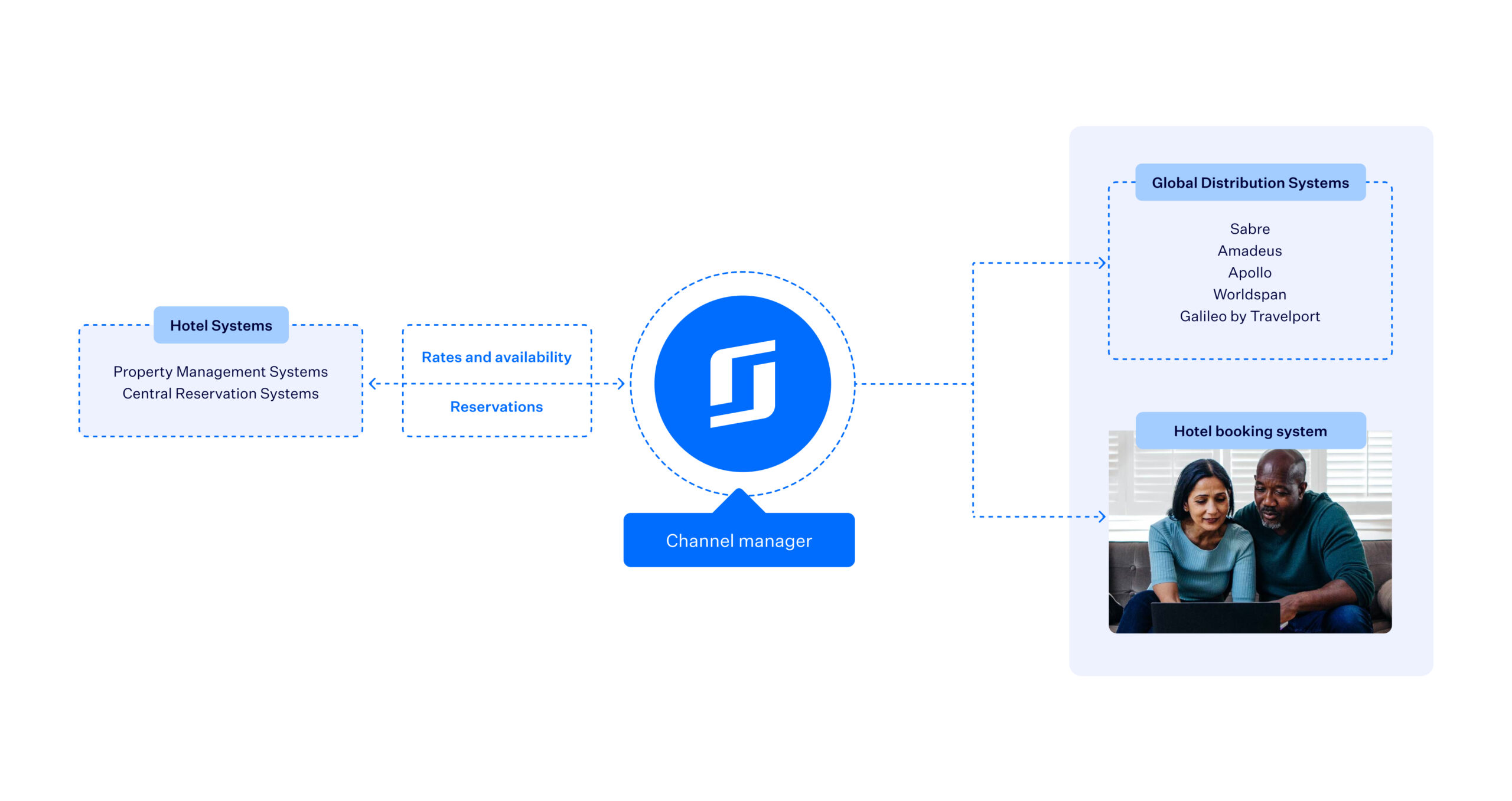What is a Global Distribution System (GDS)?
A Global Distribution System, or GDS, is a worldwide reservation system that acts as a conduit between travel bookers and suppliers, such as hotels, other accommodation providers and other travel-related services. The GDS communicates live product, price and availability data to travel agents and online booking engines for automated transactions.
A Global Distribution System is often used to tap into the corporate travel market because it has the ability to present hotels, flights, and car rentals in one simple interface, providing convenience for users. Whether your hotel is struggling to attract enough attention from travelers, or the guests you’re attracting aren’t the correct audience group, signing up to a global distribution system (GDS) might be a worthwhile option for your hotel’s business.
Despite the growth of third-party online travel agencies (OTAs) like Booking.com and Expedia, GDS systems remain the number one way to promote your hotel to the corporate travel market globally and attract travelers to your hotel.
Table of contents
What is the difference between IDS vs GDS?
Internet Distribution Systems, more commonly known as IDS, refer to internet portals that offer hotel reservations. It is a collection of internet reservation systems, travel websites and portals that concentrate on online marketing of travel, hotel and related services directly to users.
The technology provided with an IDS allows travellers to build whole packages and trips, combining flights, hotels, transportation and more that help facilitate transactions through a GDS. A GDS passes on hotel inventory and rates to travel agents and travel sites that request it and also accepts reservations.
What is the difference between GDS vs CRS?
Initially, it can appear that GDS and CRS have similar functions, with both systems communicating hotel prices and availability across different channels.
Global distribution systems link hotels inventory to business travel agents and networks, whereas a central reservation system is operated by the original vendor e.g. hotel.
CRS can also connect hotels directly to customers through metasearch engines and websites as well as OTAs.
Think of a GDS acting as a middleman between a travel agent and a hotel’s central reservation system.
The main ‘big three’ legacy GDS systems:
- Amadeus
- Travelport (that owns systems Galileo, Worldspan and Apollo)
- Sabre
Hoteliers are always looking for ways to increase their reach to attract more customers, increase revenue, and make a profit. A global distribution system is a valuable channel to achieve this.
More revenue, less work
Easily connect to the GDS via SiteMinder's integration and sell more rooms at your hotel.
Learn more
How did Global Distribution Systems develop?
The origin of global distribution systems dates back to the 1960s when airlines needed a more efficient alternative to manual methods for tracking flight schedules, availability, and prices.
Companies that utilized GDSs were among the first in the world to facilitate business-to-business (B2B) electronic commerce. Airlines realized that by automating the reservation process for travel agents, they could make agents more productive and time-efficient, essentially turning them into an extension of the airline’s sales force.
As the technology evolved, other travel sectors recognized the value of GDS connectivity. Hotels began joining these systems to reach the lucrative corporate travel market, while car rental companies, cruise lines, and tour operators followed suit.
Today, global distribution systems can book not only airfare and hotels, but also rental cars, cruises, rail tickets, and tours. For travelers booking comprehensive travel packages, GDS platforms enable them to secure all components of their trip through a single interface, rather than contacting each provider individually.
How does a Global Distribution System work in hotels?
The modern hotel distribution landscape has become increasingly complex with the growth of online travel agencies (OTAs) like Booking.com, Expedia, and Wotif. Hotels need efficient ways to manage their presence across multiple channels simultaneously. Hotels can leverage GDS technology solutions to tap into this expansive network, connecting to major systems including Amadeus, Galileo, Sabre, and Worldspan by Travelport.
Live rates and availability are sent from a hotel’s property management system (PMS) directly to the GDS and online booking websites via a channel manager. This integration ensures real-time synchronization across all distribution channels. As soon as a reservation is made on a GDS or online booking website, the channel manager instantly reduces inventory across all channels, including the hotel’s own website, and automatically delivers the reservation details back into the PMS or central reservation system (CRS).
Each GDS has its own set of connection fees and requirements. Rather than managing these connections independently, using a technology provider like SiteMinder can be a cost-effective way of accessing multiple GDS platforms through a single integration.
What is the difference between hotel Global Distribution System vs OTAs?
A Hotel Global Distribution System is a computerized network that connects travel agents, online booking sites, and service providers like hotels, airlines, and car rental companies. It provides real-time access to inventory and pricing, facilitating instant bookings and reservations.
Originally developed for airline ticket management, GDSs expanded into hospitality to give hotels broader reach among corporate travelers and travel agencies. Popular GDS platforms include Amadeus, Sabre, and Galileo.
Online Travel Agencies are consumer-facing platforms that aggregate hotel rooms, flights, and other travel services for direct booking by travelers. These digital marketplaces allow travelers to compare and book services from various providers. OTAs typically have extensive marketing reach, targeting leisure travelers through search engines, social media, and email campaigns. Leading OTAs include Booking.com, Expedia, and Agoda.
Key Differences: The primary distinction lies in their target audiences and operational approaches. GDS platforms primarily serve travel professionals and corporate travelers through a B2B model, while OTAs focus on individual travelers through B2C direct marketing, emphasizing deals and variety.
Strategic Integration: Rather than choosing between GDS and OTAs, successful hotels leverage both channels in a balanced distribution strategy. This approach maximizes reach by serving both individual leisure travelers and corporate clients, while many modern travel agencies now use both platforms to provide comprehensive services.

What are major Global Distribution System examples?
There are several major global distribution systems that house and process the vast majority of data from hotels, airlines, and other distributors. These include Amadeus, Sabre, Galileo, Worldspan, Apollo, and Pegasus.
However there are many technology providers that help hotels tap into these GDS’s and by extension the thousands of travel agents and travellers across the world.
Amadeus Global Distribution System
Amadeus has been operating for over 30 years, building critical solutions to help airlines, hotels, railways, travel agencies, tour operators and more to run their business and improve the travel experience.
The company operates in over 190 markets, with a particularly strong presence in Europe due to the company itself and database being hosted in European countries.
Amadeus has the biggest global market share footprint of any of the GDSs, with a potential reach to millions of guests. Many bookings through Amadeus are specific to airlines however hotel owners can still benefit from this major GDS.
Sabre Global Distribution System
Sabre is a leading technology and data-driven solutions provider helping airlines, hotels and travel agencies grow their businesses and transform the traveller experience on a global level.
This network is used by a range of travel suppliers, including approximately 400 airlines, 200,000 hotels, 200 tour operators, 50 rail carriers, 40 car rental outlets and 17 cruise lines.
Sabre is seen as a pioneer for online travel agencies, corporate booking tools, revenue management, as well as web and mobile itinerary tools, to name a few.
Due to its strong presence within the North American market, Sabre has a large reach to travel agencies, customers and is very attractive to hotel businesses. It has the ability to allocate hotel inventories to travel agents on a global level, and also offers a number of hospitality technology solutions.
Travelport Global Distribution System
Travelport has the smallest market share out of the ‘big three’ GDS companies and comprises the Apollo, Worldspan and Galileo global distribution systems. While the company is UK based, the main market is considered the US where its child networks can be found.
The network is less reliant on its home market compared to other GDS systems and is beneficial for hotel owners to distribute their services to travel agencies worldwide.
Galileo Global Distribution System
Due to the high market penetration of the Sabre and Apollo systems, owned by American Airlines and United Airlines, respectively, Worldspan and Galileo were created by European airline groups in an attempt to gain market share in the computer reservation system market.
Galileo GDS gives hotel owners the ability to distribute hotel rooms and availability to travel agencies globally, offering 24 hour access to inventories and information.
Worldspan Global Distribution System
Worldspan is part of the Travelport GDS platform, and is a technology leader in web-based travel eCommerce, offering solutions for all facets of travel business online.
As a leading GDS, Worldspan provides travel distribution, technologies and services for thousands of travel companies worldwide, including travel agencies, corporations, suppliers and websites.
Worldspan transforms global travel distribution and transaction processing with industry-first fares, pricing, shopping and booking technologies, and a portfolio of interactive shopping tools that enable travel companies to reduce costs, increase productivity and build revenues.
Apollo Global Distribution System
Apollo traces its roots back to 1971 when United Airlines created its first computerised central reservation system.
As a leading GDS, Apollo provides global travel distribution, technologies and services for thousands of travel companies, including travel agencies, supplies and corporations, as well as travel web sites.
The Apollo reservation system was used by United Airlines until 2012, when it switched to SHARES, a system used by its former Continental Airlines subsidiary.
Apollo is still used by Galileo International (now part of Travelport GDS) travel agency with key markets being the United States, Canada, Mexico, and Japan.
Abacus Global Distribution System
Abacus was founded in 1988 and became a leading provider of travel solutions and services in the Asia Pacific region.
The company is headquartered in Singapore and owned by Sabre Holdings, after Sabre acquired a full stake off 11 Asian airlines who were holding a majority share.
Abacus serves more than 100,000 travel agents across the 59 markets in the Asia-Pacific region and has both global and uniquely local relationships with airlines and hotels, including the leading portfolio of low-cost content and Chinese airline content.
Pegasus Global Distribution System
Pegasus strives to remove friction and create simplicity amidst an otherwise complicated environment. Pegasus Solutions pioneered the hospitality reservations industry.
The company is a market leader in the electronic processing, management, distribution, sales and marketing of hotel inventory, rates and content across different sales channels to include direct bookings via hotels’ branded websites, voice, travel agents (GDS), OTAs and metasearch partners.
No one GDS platform is known as the ‘best’. They all provide similar functionality but also have their own unique differences. Consider the following when choosing the right GDS for you:
- System’s presence in markets where your guests come from
- System’s functions and features
- Which travel websites that GDS connects into
Connect with travel agents worldwide via the GDS
SiteMinder provides seamless connectivity to global distribution system vendors, giving you instant access to travel agents and corporate booking channels worldwide.
Learn More
GDS travel software comparison table
Not all global distribution systems are built the same. Most have developed some form of niche over the years, and have consequently developed distinctive market offerings.
Let’s look at the three biggest GDSs – Amadeus, Sabre and Travelport – to see how their offerings differ.
| Amadeus | Sabre | Travelport | |
|---|---|---|---|
| Primary markets | Strong in Europe and Asia-Pacific with broad global reach | Strong in North America with deep global corporate agency footprint | Strong in EMEA and international agency markets with global coverage |
| Hotel/content reach | 650,000+ properties, 310 hotel chains | 2M+ lodging options, 400+ airlines | 650,000 properties in 180+ countries |
| Key features for hotels | CRS and distribution tools, multi-channel reach, analytics, API connectivity | CRS tool (SynXis), 600+ OTA channel integrations, strong corporate GDS reach | Travelport+ platform, multi-GDS access, impressive API options |
| Typical commission structure | Per-booking transaction fees plus agent commission ~8–12% depending on contract | Agent commission of ~8–12% plus transaction or platform fees | Highly variable, but largely in-line with GDS industry standards |
| Best for | Hotels targeting European and Asia-Pacific corporate travellers | Hotels focused on North American corporate market | Hotels seeking broad international coverage, especially EMEA |
The primary difference between the big players is their geographic focus. Sabre dominates North America, Amadeus wins in Eurasia, and Travelport is the go-to GDS in the Middle East and Africa. If you want to secure bookings from all these regions, you need to connect to all three – which is easy with SiteMinder, a platform that presents your hotel to agents across the world, and grants you instant access to high value, lull-filling corporate bookings.
What are the advantages of GDS for hotels?
The main advantage of GDS travel connectivity is increased hotel bookings and revenue through global distribution to travel professionals. This approach is particularly effective for capturing international corporate travellers, especially for hotels near major airports or business districts.
Key advantages of GDS solutions for hotels include:
Expanded Market Reach
GDS platforms connect hotels with travel agents specializing in corporate travel, opening access to lucrative business travel segments that may be difficult to reach through direct marketing channels.
Higher Booking Volume
The number of bookings generated through GDS networks generally outpaces direct bookings, as travel agents actively use these systems to find accommodations for their corporate clients.
Increased Revenue Opportunities
GDS placement positions hotel information, availability, and rates prominently where travel agents can easily access them, helping hotels maximize bookings and reach markets where travelers are willing to pay premium rates for quality accommodations.
Automated Integration
GDS systems integrate directly with your Property Management System and Central Reservation System, creating a fully automated booking process with real-time inventory updates across all channels.
24/7 Global Visibility
GDS connectivity provides round-the-clock access to your hotel inventory for travel agents worldwide, ensuring consistent booking opportunities regardless of time zones or seasonal fluctuations.
Minimal Maintenance Requirements
Once integrated, GDS connections require little ongoing maintenance, as information flows automatically between systems, reducing administrative overhead while maintaining accurate availability across all distribution channels.
Stay ahead with realtime pricing intelligence
Get daily pricing recommendations and market alerts delivered to your mobile, so you can instantly capture every revenue opportunity.
Learn more
What features should a Global Distribution System have?
The right GDS platform features can make a real difference to your business:
- Full integration between your PMS and GDS platform reduces double bookings and leads to fewer manual errors.
- Real-time GDS updates significantly reduce overbookings compared to manual management.
- The ability to target specific market segments (e.g. by region or traveller type) can help you secure more corporate travel business.
Here’s a checklist of features to look out for to ensure you’ll be able to use the GDS to its full potential:
1. Pooled inventory management
Your GDS should support pooled inventory, allowing you to market all rooms across distribution channels simultaneously rather than allocating separate inventory blocks, maximizing booking potential and revenue.
2. Commission-free structure
Choose a GDS partner that doesn’t charge commission fees for delivering bookings to your property management system, ensuring you retain maximum revenue per reservation.
3. Seamless integration
The GDS must integrate completely with your existing PMS, online booking engine, and channel manager, simplifying operations and allowing you to focus on distribution strategy rather than technical management.
4. Comprehensive reporting
Select a provider offering detailed reporting tools that allow you to analyze booking data, evaluate performance, and make informed decisions about your marketing and distribution strategies.
5. Ability to target specific markets
Your GDS should enable filtering and targeting based on geographical location and specific traveler types, helping you reach the most valuable market segments.
6. Simple and cost-effective connection
Rather than managing individual connections with multiple GDS platforms, choose a provider that offers unified access to major systems like Sabre, Travelport, and Amadeus through a single integration.
Optimizing Your Hotel Description:
Your hotel description serves as an electronic brochure for travel agents. Include the following in bulleted format with condensed, easily reviewable content that travel agents can quickly assess when sourcing accommodations for clients.
- General property overview
- Amenities, facilities, and services
- Location and transportation details
- Area attractions
- Room types and descriptions
How do I connect my hotel to a GDS?
You can’t connect your hotel directly to a GDS. You instead need to connect through a dedicated GDS platform that itself integrates with the likes of Amadeus, Sabre and Travelport. That platform will map your room types, rates and policies, then activate your property across the GDS networks. Once live, you can use the platform to control your inventory, which is distributed in real time to travel agents worldwide.
The GDS represents a vast network of more than 600,000 travel agents worldwide who use these systems to sell hotel rooms, flights, and other travel services. To access this network effectively, hotels need a technology partner that provides unified connectivity.
Connection Process: Rather than managing individual connections with each GDS platform, smart hotels use integrated GDS solutions that provide single-point access to major systems like Amadeus, Sabre, and Travelport. This approach eliminates individual setup fees while maintaining complete integration with your existing property management and central reservation systems.
How GDS Travel Booking Works
- Hotels connect their inventory to the global distribution system through a technology provider
- Travel agents access real-time room availability and rates through GDS terminals
- When bookings are made, the system automatically updates inventory across all channels to prevent overbooking
- Commission is paid only on completed transactions
- Payment flows from guest to hotel, then hotel to agent
How much does GDS cost for hotels?
GDS costs for hotels typically include a small per-booking transaction fee plus an agent commission, which is generally around 8-12% of the room rate. Additional fees also apply to the setup, access and ongoing connectivity to the GDS through your chosen connectivity partner. Exact costs for both the connection and commission fees will vary by hotel, provider and region.
GDS connectivity is often more cost-effective than many hotels realise. While OTA commissions typically range from 15-18%, GDS bookings generally cost around 10% plus a small transaction fee. Additionally, corporate travellers—the primary GDS travel market—spend approximately 50% more on hotel services, restaurants, and incidentals compared to leisure travellers, creating higher overall revenue per guest.
Is the Global Distribution System suited to your hotel?
Now that you have all the information you need to know about global distribution systems, is it relevant to you and a good fit for your hotel?
GDS systems are one of the best ways to promote your hotel in the global corporate travel market. It is among the most popular and also preferred platforms used by travel agents around the world with more than 600,000 travel agents plugging into a GDS every day on behalf of companies to book flights, hotels, car rentals and destination activities.
If you’re still a bit unsure if your hotel benefit from a GDS, there are a few specifications you can cross-reference against:
- Location of your hotel – Is it centrally located or in close proximity to an airport?
- Room capacity – What is the maximum occupancy of your hotel? Are you able to accommodate a large influx of travellers? Do you have room capacity of more than 20 rooms?
- Services – Can lodgings be set up for corporate markets? Is your hotel prepared for bookings all year round and not affected by seasons?
These requirements are not essential but will be beneficial and can greatly aid a successful GDS connection. It’s also important to choose an established provider and make sure you ask for training and support.
Need to discuss it with an expert? Get in touch with our team by clicking the link.
Which GDS is best for my hotel?
The best GDS for your hotel depends on where your guests originate. Amadeus dominates Europe and Asia-Pacific, Sabre leads in North America, and Travelport has strong coverage in EMEA and international markets. For most hotels, connecting to all three maximises reach — which is why platforms like SiteMinder offer unified access to the major GDS networks through a single integration.
How can a GDS assist in capturing cruise travel bookings?
While hotels and cruise ships may seem similar—both providing accommodation and hospitality services—they operate with distinct inventory systems, distribution strategies, and booking processes. However, their customer bases often overlap, creating opportunities for hotels to capture additional revenue through strategic GDS positioning.
The Growing Cruise Market Opportunity
The cruise market is definitely expanding after seeing a setback following the pandemic, with global revenue now at approximately $19.4 billion. Every harbour city in the world has a cruise ship docked outside and with everything from super cruises to niche adventure cruises, travellers are finding them a more accessible form of holiday. Notably, 70% of cruise bookings are made through travel agents, who provide the expertise and personal service cruise passengers value.
Strategic Hotel Positioning
Hotels can capitalize on cruise travel through the ‘cruise-and-stay’ phenomenon, where passengers extend their trips by arriving early or staying additional days after disembarkation. This trend creates substantial accommodation demand in port cities, as travelers seek to maximize their vacation experience by exploring destinations on land.
Through GDS connectivity, hotels position themselves where travel agents are already booking cruise packages, making it seamless for agents to add pre- and post-cruise accommodations. This integration transforms what could be separate booking processes into comprehensive travel solutions, benefiting both travelers seeking convenience and hotels seeking to capture this lucrative extended-stay market.


